
- •Module 1.
- •Seminar 2
- •1. Pronounce the following words:
- •3. What consonant and vowel changes are illustrated by the following pairs of words:
- •The Old English Vowels
- •The Old English Consonants
- •Seminar 3 oe Grammar
- •B) Demonstrative Pronouns; c) Other Types of Pronouns.
- •Індивідуальна робота студентів
- •Самостійна робота студентів
- •Модульний контроль
- •Module 2.
- •Helpful Information Middle English Phonology Consonants
- •Middle English Prosody
- •Middle English Graphics & Writing
- •SeminarS 5-6. Evolution of the Grammatical System from the 11th to 18th c.
- •Індивідуальна робота студентів
- •Самостійна робота студентів
- •Middle English Syntax
- •New English Syntax
- •Classification of the Dialects of English
- •Модульний контроль
- •Перелік питань підсумкового контролю.
Module 1.
Some Theoretical Aspects of Language History. Germanic Languages and Their Linguistic Features. Old English (Seminars 1-3).
SEMINAR 1
Sources and Origin of English
1. Proto-Germanic and Its Principal Linguistic Features:
a) Word Stress;
b) Vowels and the Main Linguistic Changes of the Period (Independent and Assimilative);
c) Consonants; the First Consonant Shift (Grimm’s Law);
d) Voicing of Fricatives (Verner’s Law).
2. Pre-Germanic Britain.
a) Celts;
b) Roman Conquest of the Isles.
3. First Germanic Alphabets.
4. Germanic Settlement of Britain.
5. Conversion of the Anglo-Saxons to Christianity.
6. Historical Outline of the OE Period:
a) Danish Raids;
b) Reign of King Alfred and His Reforms.
7. OE Dialects.
8. First Anglo-Saxon Written Records.
9. OE Alphabet.
LITERATURE
A) Principal:
1. Історія англійської мови / Навчальний посібник для самостійної роботи студентів-філологів, що вивчають англійську мову як фах. – Полтава, 2002. – C. 10-29.
2. Rastorgueva T.A. A History of English. – M., 1983. – Chapter III (P. 34-42), Chapter IV (P. 49-55), Chapter V (P. 55-63), Chapter VI-VII (P. 63-74).
B) Supplementary:
1. Аракин В.Д. История английского языка: Учеб. пособие для студентов пед. ин-тов. – М., 1985. – С.22-30.
2. Голицынский Ю.Б. Великобритания. (На англ. яз.) – СПб., 2001. – С.63-65.
3. ЗалесскаяЛ.Д., Матвеева Д.А.Пособие по истории английского языка для заочных отделений факультетов английского языка педагогических институтов. –М., 1984.–C. 8-12, 18-19.
4. Иванова И.П., Чахоян Л.П., Беляева Т.М. История английского языкa. – CПб., 1999. – С. 7, 10-11, 14-15, 18.
5. Ильиш Б.А. История английского языка. (На англ. яз.). Учебник для студентов фак. иностр. яз. пед. ин-тов. – Л., 1972. – С. 36-37, 42-43.
6. Tokareva E. Pages of History. Great Britain, the USA. – M., 1985.
7. Zaitseva S.D. Early Britain. – M., 1981. – Chapter I, II (P. 14-44), Chapter III, IV, V (P.47-79).
Practice assignment
Read and translate the text.
People have long speculated that their languages came from a single source; during the Renaissance, for example, scholars noted that languages seemed to group themselves in the ways they said "god": Latin deus, Spanish dios, vs. Swedish gud, English god, vs. Russian and Polish bog, etc. As early as 1767, physician James Parsons collected numbers from many European languages, as well as those of Iran and India, and found them to be quite similar; he concluded that they must have all come from one source: Noah’s Ark. But Sir William Jones, Chief Justice of India, took this observation a step further. As an educated man, he was trained in the classical languages, so that when he went to India and began to examine Sanskrit, he saw right away how similar it was to Greek and Latin, not only in vocabulary, but even in inflections and grammatical features. His address to the Bengal Asiatic Society in 1786 contained the first clear assertion of the existence of Proto-Indo-European.
The Sanskrit language, whatever be its antiquity, is of a wonderful structure; more perfect than the Greek, more copious than the Latin, and more exquisitely refined than either, yet bearing to both of them a stronger affinity, both in the roots of verbs, and in the forms of grammar, than could possibly have been produced by accident; so strong, indeed, that no philologer could examine them all three, without believing them to have sprung from some common source, which, perhaps, no longer exists.
Building upon this observation, Rasmus Rask said that scholars had to do more than just use intuition to set up a proto-language; they had to find regularities and systematic developments. For example, he noticed that certain sounds in Greek (e.g., ph, as in phrater ‘brother’ and phero ‘I carry’) corresponded regularly to other sounds in Germanic (e.g. b, as in Eng. brother and bear). Jacob Grimm, famous as a collector of fairly tales, was the first to publish a systematic explanation of how Germanic must have diverged, in extremely consistent ways, from the proto-language. His explanation is now called "Grimm’s Law."
Read the table, translate the unknown words and comment on the changes. Add the Ukrainian examples.
Grimm’s Law in Detail
Further changes following Grimm's Law, as well as sound changes in other Indo-European languages, can sometimes obscure its effects. The most illustrative examples are used here.
|
Change |
Germanic (shifted) examples |
Non-Germanic (unshifted) cognates |
|
*p→f |
English: foot, German: Fuß, Gothic: fōtus, Icelandic, Faroese: fótur, Danish: fod, Norwegian, Swedish: fot |
Ancient Greek: πούς (pūs), Latin: pēs, pedis, Sanskrit: pāda, Russian: под (pod), Lithuanian: pėda, Welsh pel |
|
*t→þ |
English: third, Old High German: thritto, Gothic: þridja, Icelandic: þriðji |
Ancient Greek: τρίτος (tritos), Latin: tertius, Gaelic treas, Irish: trí, Sanskrit: treta, Russian: третий (tretij), Lithuanian: trečias |
|
*k→x (x later became h) |
English: hound, Dutch: hond, German: Hund, Gothic: hunds, Icelandic, Faroese: hundur, Danish, Norwegian, Swedish: hund |
Ancient Greek: κύων (kýōn), Latin: canis, Gaelic, Irish: cú, Welsh ci |
|
*kʷ→hw |
English: what, Gothic: ƕa ("hwa"), Danish hvad, Icelandic: hvað, Faroese hvat, Norwegian: hva |
Latin: quod, Gaelic: ciod, Irish: cad, Sanskrit: ka-, kiṃ, Russian: ко- (ko-), Lithuanian: ką' |
|
*b→p |
English: warp; Swedish: värpa; Dutch: werpen; Icelandic, Faroese: varpa, Gothic wairpan |
Latin: verber |
|
*d→t |
English: ten, Dutch: tien, Gothic: taíhun, Icelandic: tíu, Faroese: tíggju, Danish, Norwegian: ti, Swedish: tio |
Latin: decem, Greek: δέκα (déka), Gaelic, Irish: deich, Sanskrit: daśan, Russian: десять (desyat'), Lithuanian: dešimt, Welsh deg |
|
*g→k |
English: cold, Dutch: koud, German: kalt, Icelandic, Faroese: kaldur, Danish: kold, Norwegian: kald, Swedish: kall, |
Latin: gelū |
|
*gʷ→kw |
English:quick,Frisian:quick, queck,Dutch:kwiek,Gothic:qius,OldNorse:kvikr,Icelandic,Faroese:kvikur,Swedish:kvick,Norwegiankvikk |
Lithuanian: gyvas |
|
*bʰ→b |
English: brother, Dutch: broeder, German: Bruder, Gothic: broþar, Icelandic, Faroese: bróðir, Danish, Swedish: broder, Norwegian bror |
Sanskrit: (bhrātā), Russian: брат (brat), Lithuanian: brolis, Old Church Slavonic: братръ (bratru) |
|
*dʰ→d |
English: door, Frisian: doar, Dutch: deur, Gothic: daúr, Icelandic, Faroese: dyr, Danish, Norwegian: dør, Swedish: dörr |
Irish: doras, Sanskrit: dwār, Russian: дверь (dver'), Lithuanian: durys |
|
*gʰ→g |
English: goose, Frisian: goes, Dutch: gans, German: Gans, Icelandic: gæs, Faroese: gás, Danish, Norwegian, Swedish: gås |
Russian: гусь (gus') |
|
*gʷʰ→gw→w |
English: wife, Proto-Germanic: wiban (from former gwiban), Old Saxon, Old Frisian: wif, Dutch: wijf, Old High German: wib, German: Weib, Old Norse: vif, Icelandic: víf, Faroese: vív, Danish, Swedish, Norwegian: viv |
Tocharian A: kip, B: kwípe (vulva) |
Note: Some linguists dispute the origin of the word "wife". Calvert Watkins has assumed the root word is Proto-Indo-European *gʷʰíbʰ-.
This is strikingly regular. Each phase involves one single change which applies equally to the labials (p, b, bʰ, f) and their equivalent dentals (t, d, dʰ, þ), velars (k, g, gʰ, h) and rounded velars (kʷ, gʷ, gʷʰ, hw). The first phase left the phoneme repertoire of the language without voiceless stops, the second phase filled this gap but created a new one, and so on until the chain had run its course.
Read and translate “Grimm’s tale” by Michelle Girard. Comment on it.
The following fairy tale was created as a fun way for you to have a "Grimm encounter." It is designed so that you can discover the generalizations that Rask and Grimm came up with on your own. Notice that the earliest part of the story uses reconstructed Proto-Indo-European roots, the next section uses reconstructed Proto-Germanic words (that is, words that we assume were found in the ancestor of all the Germanic languages), followed by Old English, Middle English, and Modern English.
As the tale moves through the phases of the development of the English language, a shift from one period to another will be indicated by the phase of the moon image above the paragraph. Dark moon = Proto-Indo-European; Crescent moon = Proto-Germanic; Half moon = Old English; Three-quarters moon = Middle English; Full moon = Modern English.
|
|
|
n |
|
|
|
n |
|
|
|
a |
|
|
|
o |
|
|
|
i |
|
|
|
h |
|
|
|
h s |
|
|
|
e The End original story by Michelle Girard, 1998 |
http://colfa.utsa.edu/drinka/pie/grimm_tale.htm

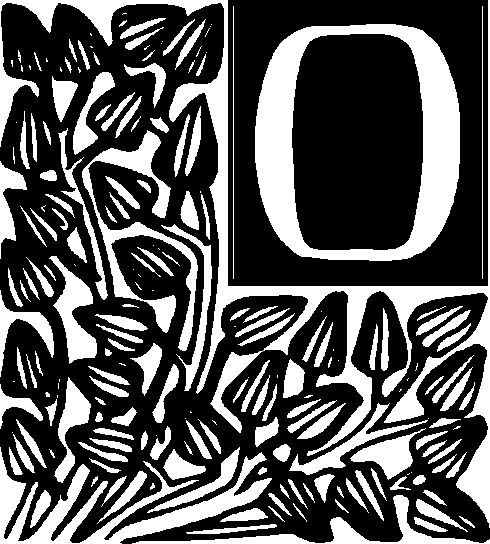 ce
upon a time there was a boy who lived alone in the forest
clearing. Although there was a fresh stream and a small garden
that grew
ce
upon a time there was a boy who lived alone in the forest
clearing. Although there was a fresh stream and a small garden
that grew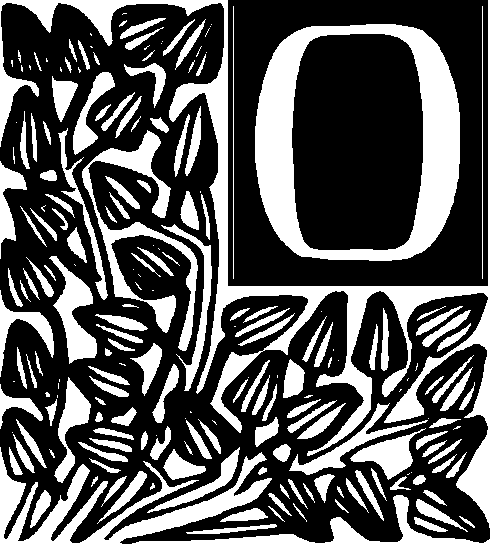 a
a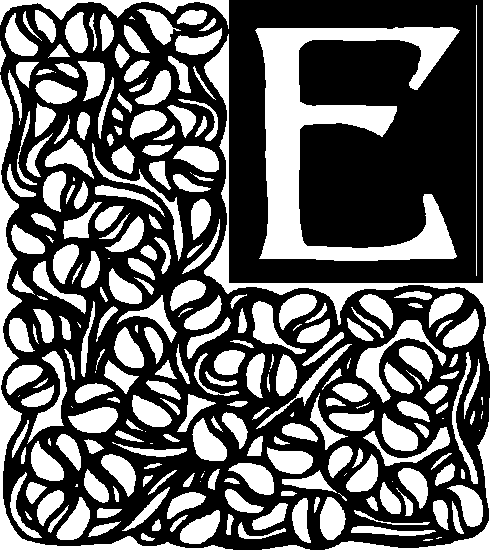 rly
the next day, when the
rly
the next day, when the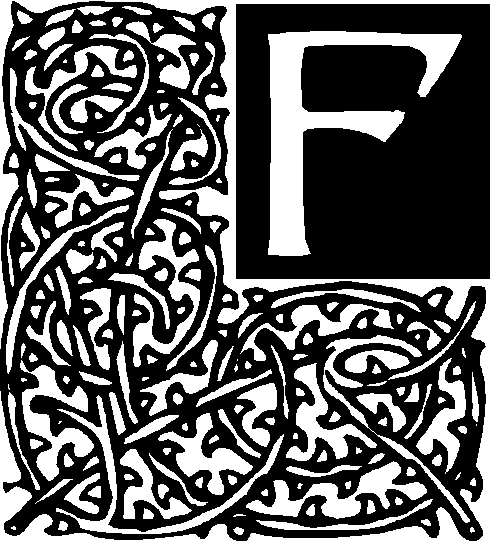 r
many days
r
many days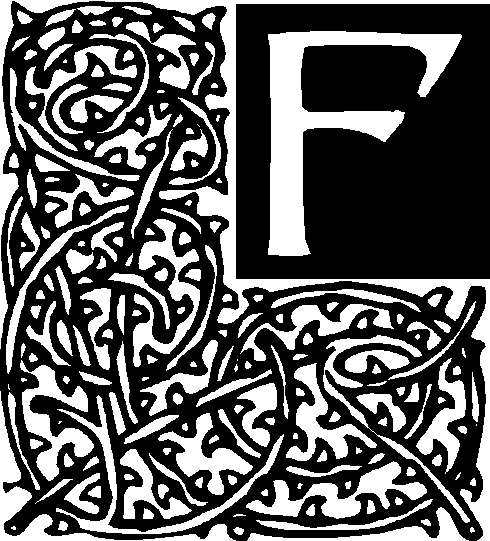 nally
the sun rose on a beautiful day, yet the
nally
the sun rose on a beautiful day, yet the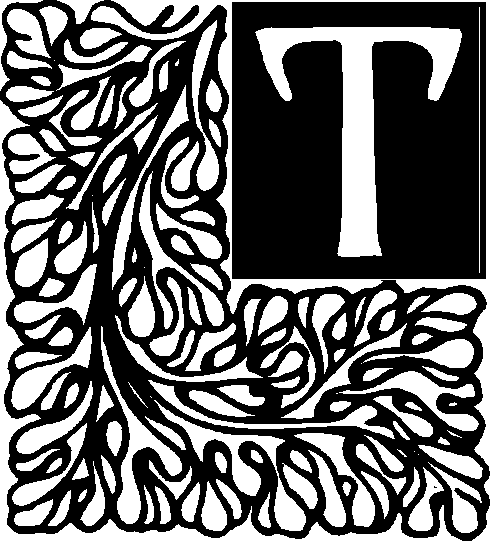 e
boy crossed thecorn-
filled valley, slowly making his way past the blossoms and tall
grasses, his
e
boy crossed thecorn-
filled valley, slowly making his way past the blossoms and tall
grasses, his 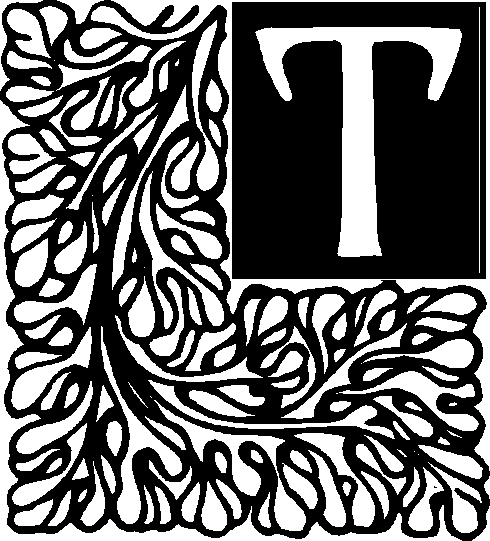 ebear
and the wolf
looked at Brother
with familiar eyes, and seemed to be asking for his help. Brother
stood, pondering what to do next, when the singing moon
spoke to him again. This time, though, it was not the voice of
Father,
but a lovely lady’s voice, singing, "Brother,
son,
you’ve traveled far, and proved the strength within your heart.
Return, my child, what man once stole, and receive the wish within
your soul." Suddenly the boy knew what to do. He took off the
necklace of teeth
and emptied the purse of corn
and placed them before the captive animals. In a bright flash
there stood Father
and Sister,
no longer a dream but real.
ebear
and the wolf
looked at Brother
with familiar eyes, and seemed to be asking for his help. Brother
stood, pondering what to do next, when the singing moon
spoke to him again. This time, though, it was not the voice of
Father,
but a lovely lady’s voice, singing, "Brother,
son,
you’ve traveled far, and proved the strength within your heart.
Return, my child, what man once stole, and receive the wish within
your soul." Suddenly the boy knew what to do. He took off the
necklace of teeth
and emptied the purse of corn
and placed them before the captive animals. In a bright flash
there stood Father
and Sister,
no longer a dream but real. 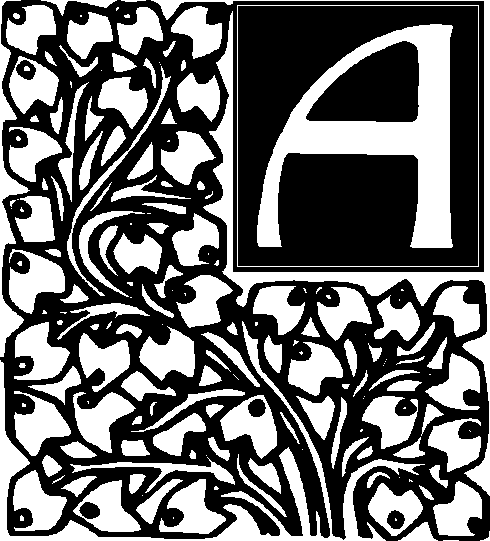 Brother
stood, astonished with joy, his Father
(for it was his Father
that he dreamed of, and the dream girl, his Sister)
explained, "I was hunting in the woods one day, and wandered
to a place more lovely than I had ever seen. There I shot my arrow
at animals who were sacred to the moon,
for this was her glade which I had blundered into. For my
transgression the goddess transformed myself and my daughter,
who had also been in the wood gathering berries, into the animals,
until one of my blood proved brave and true. That one was
you, my ownson!"
Brother
stood, astonished with joy, his Father
(for it was his Father
that he dreamed of, and the dream girl, his Sister)
explained, "I was hunting in the woods one day, and wandered
to a place more lovely than I had ever seen. There I shot my arrow
at animals who were sacred to the moon,
for this was her glade which I had blundered into. For my
transgression the goddess transformed myself and my daughter,
who had also been in the wood gathering berries, into the animals,
until one of my blood proved brave and true. That one was
you, my ownson!"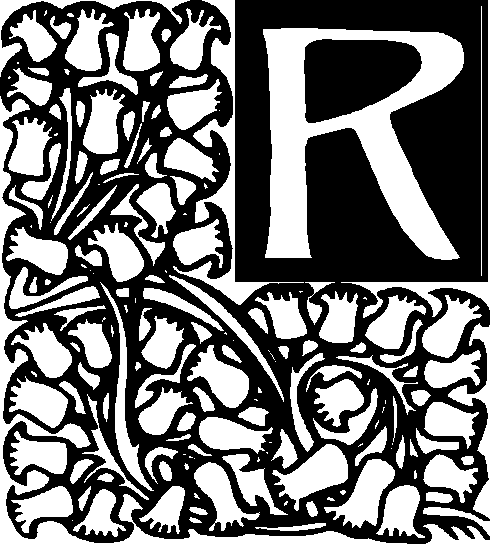 united,
the family returned home and, never again taking from the wood
more than they needed, they lived in peace for ever after.
united,
the family returned home and, never again taking from the wood
more than they needed, they lived in peace for ever after.